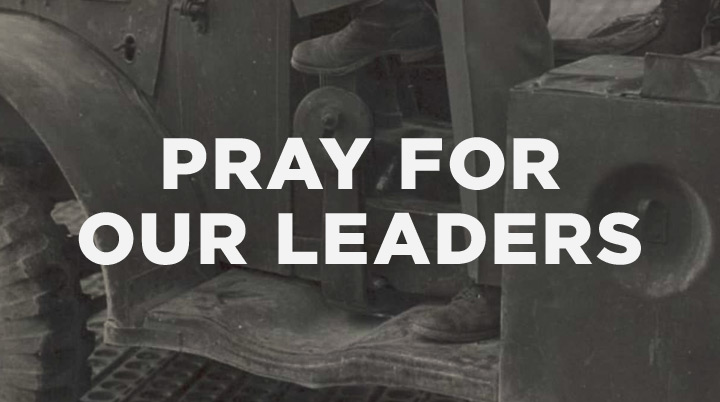Latest
-
Objections to the Christian Faith from the Unchurched and De-Churched
 Tue Dec 02, 2014
Tue Dec 02, 2014
by Resurgence -
Craig Groeschel: We Innovate for Jesus
 Tue Oct 14, 2014
Tue Oct 14, 2014
by Resurgence -
Mark Driscoll: Revelation
 Tue Oct 07, 2014
Tue Oct 07, 2014
by Resurgence -
RESURGENCE LEADERSHIP #034: JOHN PIPER, WHY I TRUST THE SCRIPTURES, PART 2
 Tue Sep 30, 2014
Tue Sep 30, 2014
by Resurgence -
Resurgence Leadership #033: John Piper, Why I Trust the Scriptures, Part 1
 Tue Sep 23, 2014
Tue Sep 23, 2014
by Resurgence

Archives
Pray for Our Leaders

You cannot avoid politics. It’s everywhere you turn. It’s everywhere you look. When you think about it, it’s kind of creepy to think just how ubiquitous political advertising is.
Why shouldn’t it be?
There are billions of dollars spent on advertising for local, state, and federal political campaigns in any given voting cycle.
From social media, blog posts, websites, emails, television, radio, newspapers, magazines, billboards, buses, signs in yards, and politicians with manufactured smiles on street corners, politics is everywhere you turn. Unless you join a commune or moved to an Amish village, you have no hope avoiding politics.
Now, there’s one thing you need to keep in mind with political campaigns when it comes to their purpose. Their purpose is to make you think and feel a particular way about the candidates and the positions they stand for. Some ads are meant to make a particular candidate worthy of your vote, whereas other ads are meant to make a particular candidate unworthy of your vote. As Christians, this is where we need to be careful.
We need to be careful that our political opinions are shaped less by political campaigns and radio talk show hosts, and more influenced by God’s will, which he has revealed to us in the Bible (Rom. 12:1–2; 2 Tim. 3:16; 2 Pet. 1:20–21).
Yes, we should be informed citizens who take our privilege of voting seriously. Our involvement with the political process is what makes the form of government in the United States work. But God has something much more in mind for us when it comes to our political involvement.
How Christians Can Best Please God in Politics
When it comes to politics, there is one thing in particular that pleases God. What pleases God is that we pray for our leaders, regardless of who they are and what political party they represent.
We read in 1 Timothy 2:1–3, we read:
First of all, then, I urge that supplications, prayers, intercessions, and thanksgivings be made for all people, for kings and all who are in high positions. . . . This is good, and it is pleasing in the sight of God our Savior.
God, through Paul, didn’t specify what leaders we are to pray for and not pray for. He didn’t say we should only pray for one particular political party. He simply said, pray “for kings and all who are in high positions.”
What Leaders We Should Pray For
Some of you will find this hard to swallow. I get that. If this is you I ask for you to consider just this one thing, “Who was in power in Rome when Paul penned these words?”
Nero.
Nero wasn’t just a bad person. Nero wasn’t even just a bad politician. Nero was an evil and ruthless ruler. He was personally responsible for overseeing the martyrdom of many Christians, even the deaths of Paul and Peter.
Even though this was the case, Paul didn’t ask the church to remove him or pray for his demise. Paul asked the church to pray for him and the various other leaders in Rome and elsewhere.
Regardless of who the elected or appointed officials are and what party and platform they represent, we are to pray for them and respect the very office they’re filling. This is what is clearly pleasing to God.
How We Should Pray for Our Leaders
Thankfully, God didn’t leave us to our own creativity in how we should pray for our leaders; he gave us clear directions in guiding the prayers for our leaders. Our prayers for our governing leaders are to be made, so that we “may lead a peaceful and quiet life, godly and dignified in every way” (1 Tim. 2:2).
In light of extreme persecution, Paul asked for Timothy and the church to pray for a peaceful and quiet life. The end of these prayers is not just a peaceful and quiet life. The end of these prayers is to create an environment that we can live godly and dignified lives, which reflects well on Jesus (1 Tim. 2:11; 3:7; 5:7, 14; 6:1).
I believe this is an important lesson for Christians to learn and one that has been exemplified by my dear friend Rick Warren modeled this well for us when he hosted a presidential debate in 2008 and prayed the invocation prayer for President Barack Obama’s inauguration that same year.
Our involvement within the political process should reflect well on Jesus, and not just our political opinions. At the end of the day we want to make sure that we’re making a difference for Jesus, and not making a lot of political points.